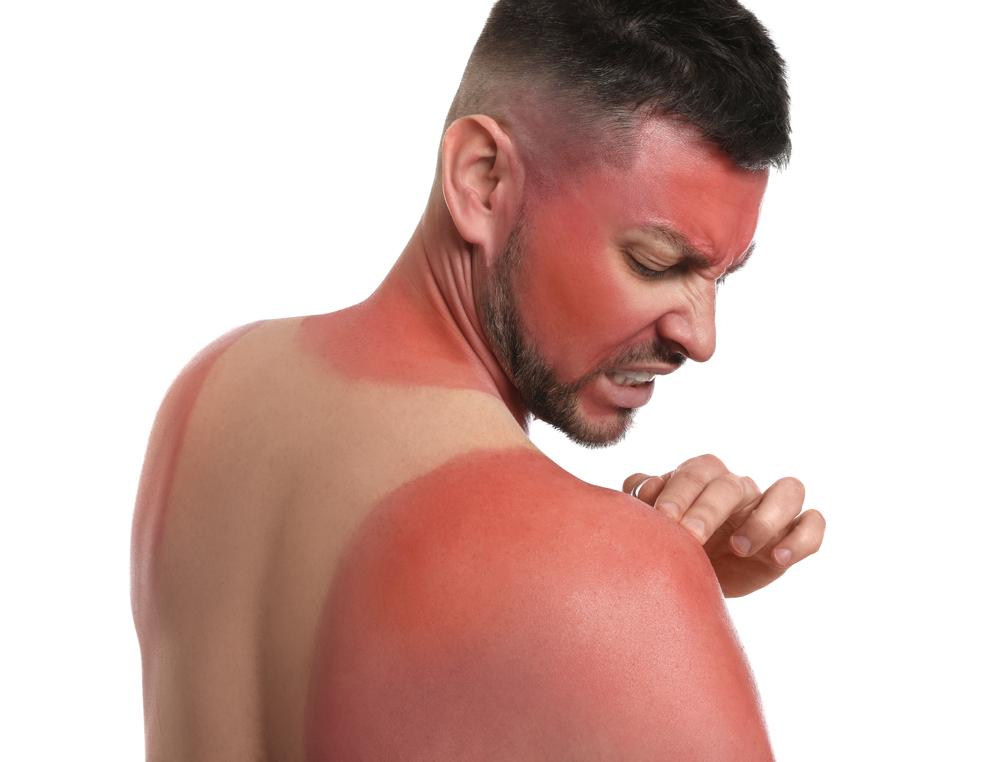
If you need to know how to treat severe sunburn, there are several steps you can take from home to help your skin heal. At the very least, try to get good quality sleep, keep your skin cool and moisturized, drink your water, and apply aloe vera or hydrocortisone cream. But most importantly, stay out of the sun!
Suffering from a really bad sunburn? Wondering when to go to the emergency room for sunburns? Complete Care explains how to get rid of a sunburn quickly and when to seek medical attention.
What is the fastest way to get rid of sunburn?
Aside from applying a cold compress, there aren’t many options for long-lasting, instant sunburn relief. However, you can take steps to speed up the healing process. Here are some home remedies for sunburns.
1. Get a good night’s sleep
Good sleep is essential for general health, but when recovering from a sunburn, your body needs the rest time even more. Disrupting your sleep can disrupt your body’s ability to heal itself.
2. Keep your skin cool
An easy way to cool off your red, hot skin is to apply a cold compress or jump in a cool bath or shower. Avoid using ice directly on the skin as it could cause further damage.
3. Moisturize
After getting out of the bath or shower, leave a little water on your skin and apply moisturizer or petroleum jelly immediately to affected areas. Doing so will trap the water and hydrate your skin, helping to prevent peeling and create a barrier between your skin and potential irritants.
4. Stay hydrated
Sunburns can pull moisture from your skin and prevent you from releasing heat properly, which can lead to dehydration. Try adding electrolytes to your water and drink plenty of fluids.
If water and electrolytes aren’t enough to provide proper hydration, you may need to receive a dehydration treatment IV from the emergency room.
5. Apply aloe vera
Aloe vera is a well known option for sunburn treatment. It contains anti-inflammatory ingredients that help reduce inflammation and can provide some pain relief. Regular use of aloe vera provides an extra layer of hydration and prevents the skin from peeling.
6. Take over-the-counter (OTC) pain relievers as needed
When the discomfort from your sunburn becomes too much, you can take an OTC tablet or apply hydrocortisone cream topically. OTC pain relievers will help reduce some of the pain and itching and may help reduce the inflammation that causes sunburn swelling.
Be sure to consult with your doctor first to prevent any interactions with current medications.
7. Avoid sun exposure
If your skin is already burnt, the last thing you want to do is exacerbate the issue and put yourself more at risk for skin cancer. Stay out of the sun when possible and avoid tanning beds. If you do need to be outdoors, apply sunscreen, stay in the shade, and keep your skin covered with protective clothing.
Second Degree Sunburn Treatment
There are two main types of burns: first degree sunburns and second degree sunburns. Second degree sunburns typically cover larger areas of the body and take much longer to heal than first degree sunburns. When it comes to severe, second degree sunburns, home remedies may not be as effective. Seek medical treatment as soon as possible.
These sunburns can lead to sun poisoning resulting in symptoms such as blistering, infection, nausea, vomiting, fever, and dehydration. If you have any of these symptoms, it’s time to visit your local ER for treatment.
Continue reading: How to treat nausea and vomiting.
How long does a severe sunburn last?
The healing time for a really bad sunburn depends on its severity. If it’s a first degree sunburn and you have no symptoms aside from pink or reddish skin, it should heal within three days. A moderate sunburn likely will heal in about five days and may result in peeling skin. If you are suffering from a severe sunburn, you may be burnt for a week or more and should seek medical treatment.
How to Prevent Bad Sunburns
Using a broad spectrum, water-resistant sunscreen can protect your skin from severe sunburn and help to prevent skin cancer. When it comes to sunscreen, is higher SPF better? The short answer — not necessarily. For the best protection, use a sunscreen with an SPF 15 – 50. Reapplying every two hours will ensure optimal protection.
When to Go to The Emergency Room For Sunburns
Depending on how severe your sunburn is, you may need to know when to go to ER for a burn. Keep an eye out for a sunburn accompanied by any of the following symptoms:
- Sunburn swelling or blistering
- Fever
- Dizzy
- Nausea and vomiting
- Headache
- Muscle cramps
Severe sunburn? Don’t wait! Head to a Complete Care emergency room.
Knowing how to treat a severe sunburn at home doesn’t always mean you’ll be able to avoid sun poisoning. Over 33,000 cases of sunburn end up in the ER a year.
We hope you won’t be one of them, but if you are, Complete Care has free-standing emergency rooms in Texas and Colorado and are fully equipped to handle all types of burns including severe sunburn. Head into one of our ER locations for any of your emergency needs.
More Helpful Articles by Complete Care:
